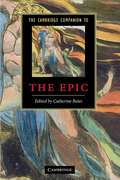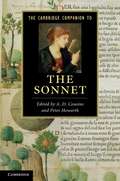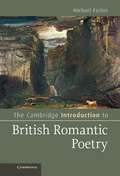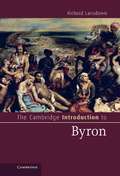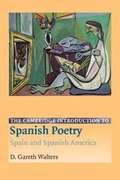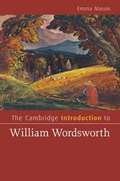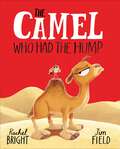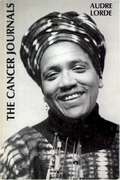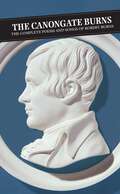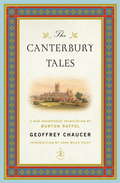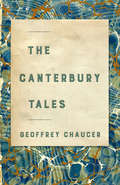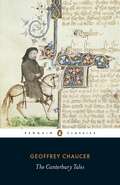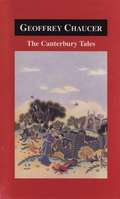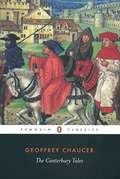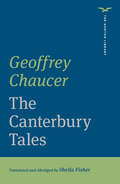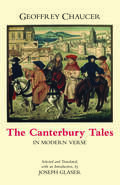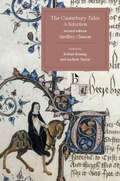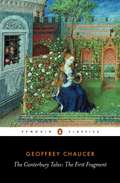- Table View
- List View
The Cambridge Companion to Wordsworth
by Stephen GillSpecially commissioned essays cover the important aspects of Wordsworth's life and work. The volume examines his poetic achievement with chapters on poetic craft, the origin of his poetry and the challenges it presents. The book offers students informative supplementary material on Wordsworth's life and critical reception.
The Cambridge Companion to the Epic
by Catherine BatesEvery great civilisation from the Bronze Age to the present day has produced epic poems. Epic poetry has always had a profound influence on other literary genres, including its own parody in the form of mock-epic. This Companion surveys over four thousand years of epic poetry from the Babylonian Epic of Gilgamesh to Derek Walcott's postcolonial Omeros. The list of epic poets analysed here includes some of the greatest writers in literary history in Europe and beyond: Homer, Virgil, Dante, Camões, Spenser, Milton, Wordsworth, Keats and Pound, among others. Each essay, by an expert in the field, pays close attention to the way these writers have intimately influenced one another to form a distinctive and cross-cultural literary tradition. Unique in its coverage of the vast scope of that tradition, this book is an essential companion for students of literature of all kinds and in all ages.
The Cambridge Companion to the Sonnet
by Peter Howarth A. D. Cousins"Beginning with the early masters of the sonnet form, Dante and Petrarch, the Companion examines the reinvention of the sonnet across times and cultures, from Europe to America. In doing so, it considers sonnets as diverse as those by William Shakespeare, William Wordsworth, George Herbert and e. e. cummings. The chapters explore how we think of the sonnet as a 'lyric' and what is involved in actually trying to write one. The book includes a lively discussion between three distinguished contemporary poets - Paul Muldoon, Jeff Hilson and Meg Tyler - on the experience of writing a sonnet, and a chapter which traces the sonnet's diffusion across manuscript, print, screen and the internet. A fresh and authoritative overview of this major poetic form, the Companion expertly guides the reader through the sonnet's history and development into the global multimedia phenomenon it is today"--
The Cambridge Companion to …: The Cambridge Companion to Petrarch
by Albert Russell Ascoli Ascoli, Albert Russell and Falkeid, Unn Unn FalkeidPetrarch (Francesco Petrarca, 1304–74), best known for his influential collection of Italian lyric poetry dedicated to his beloved Laura, was also a remarkable classical scholar, a deeply religious thinker and a philosopher of secular ethics. In this wide-ranging study, chapters by leading scholars view Petrarch's life through his works, from the epic Africa to the Letter to Posterity, from the Canzoniere to the vernacular epic Triumphi. Petrarch is revealed as the heir to the converging influences of classical cultural and medieval Christianity, but also to his great vernacular precursor, Dante, and his friend, collaborator and sly critic, Boccaccio. Particular attention is given to Petrach's profound influence on the Humanist movement and on the courtly cult of vernacular love poetry, while raising important questions as to the validity of the distinction between medieval and modern and what is lost in attempting to classify this elusive figure.
The Cambridge History of American Poetry
by Stephen Burt Alfred BendixenThe Cambridge History of American Poetry offers a comprehensive exploration of the development of American poetic traditions from their beginnings until the end of the twentieth century. Bringing together the insights of fifty distinguished scholars, this literary history emphasizes the complex roles that poetry has played in American cultural and intellectual life, detailing the variety of ways in which both public and private forms of poetry have met the needs of different communities at different times. The Cambridge History of American Poetry recognizes the existence of multiple traditions and a dramatically fluid canon, providing current perspectives on both major authors and a number of representative figures whose work embodies the diversity of America's democratic traditions.
The Cambridge Introduction to British Romantic Poetry
by Michael FerberThe best way to learn about Romantic poetry is to plunge in and read a few Romantic poems. This book guides the new reader through this experience, focusing on canonical authors – Wordsworth, Coleridge, Byron, Keats, Blake and Shelley – whilst also including less familiar figures as well. Each chapter explains the history and development of a genre or sets out an important context for the poetry, with a wealth of practical examples. Michael Ferber emphasizes connections between poets as they responded to each other and to great literary, social and historical changes around them. A unique appendix resolves most difficulties new readers of works from this period might face: unfamiliar words, unusual word order, the subjunctive mood and meter. This enjoyable and stimulating book is an ideal introduction to some of the most powerful and pleasing poems in the English language, written in one of the greatest periods in English poetry.
The Cambridge Introduction to Byron
by Richard LansdownAuthor of the most influential long poem of its era (Childe Harold's Pilgrimage) and the funniest long poem in European literature (Don Juan), Lord Byron was also the literary superstar of Romanticism, whose effect on nineteenth-century writers, artists, musicians and politicians – but also everyday readers – was second to none. His poems seduced and scandalized readers, and his life and legend were correspondingly magnetic, given added force by his early death in the Greek War of Independence. This introduction compresses his extraordinary life to manageable proportions and gives readers a firm set of contexts in the politics, warfare, and Romantic ideology of Byron's era. It offers a guide to the main themes in his wide-ranging oeuvre, from the early poems that made him famous (and infamous) overnight, to his narrative tales, dramas and the comic epic left incomplete at his death.
The Cambridge Introduction to Milton
by Stephen B. DobranskiJohn Milton is one of the most important and influential writers in English literary history. The goal of this book is to make Milton's works more accessible and enjoyable by providing a comprehensive overview of the author's life, times and writings. It describes essential details from Milton's biography, explains some of the cultural and historical contexts in which he wrote, offers fresh analyses of his major pamphlets and poems - including Lycidas, Areopagitica and Paradise Lost - and describes in depth traditional and recent responses to his reputation and writings. Separate sections focus on important concepts or key passages from his major works to illustrate how readers can interpret - and get excited about - Milton's writings. This detailed and engaging introduction to Milton will help readers not only better understand the author's life and works but also better appreciate why Milton matters.
The Cambridge Introduction to Modernist Poetry
by Peter HowarthModernist poems are some of the twentieth-century's major cultural achievements, but they are also hard work to read. This wide-ranging introduction takes readers through modernism's most famous poems and some of its forgotten highlights to show why modernists thought difficulty and disorientation essential for poetry in the modern world. In-depth chapters on Pound, Eliot, Yeats and the American modernists outline how formal experiments take on the new world of mass media, democracies, total war and changing religious belief. Chapters on the avant-gardes and later modernism examine how their styles shift as they try to re-make the community of readers. Howarth explains in a clear and enjoyable way how to approach the forms, politics and cultural strategies of modernist poetry in English.
The Cambridge Introduction to Spanish Poetry
by D. WaltersThe Cambridge Introduction to Spanish Poetry comprises an extended survey of poetry written in Spanish from the Middle Ages to the present day, including both Iberian and Latin American writing. This volume offers a non-chronological approach to the subject in order to highlight the continuity and persistence of genres and forms (epic, ballad, sonnet) and of themes and motifs (love, religious and moral poetry, satirical and pure poetry). It also supplies a thorough examination of the various interactions between author, text and reader. Containing abundant quotation, it gives a refreshing introduction to an impressive and varied body of poetry from two continents, and is an accessible and wide-ranging reference-work, designed specifically for use on undergraduate and taught graduate courses. The most comprehensive work of its kind available, it will be an invaluable resource for students and teachers alike.
The Cambridge Introduction to Victorian Poetry
by Linda K. HughesVictorian poetry was read and enjoyed by a much larger audience than is sometimes thought. Publication in widely-circulating periodicals, reprinting in book reviews, and excerpting in novels and essays ensured that major poets such as Tennyson, Browning, Hardy and Rossetti were household names, and they remain popular today. The Cambridge Introduction to Victorian Poetry provides an accessible overview of British poetry from 1830 to 1901, paying particular attention to its role in mass media print culture. Designed to interest both students and scholars, the book traces lively dialogues between poets and explains poets' choices of form, style and language. It also demonstrates poetry's relevance to Victorian debates on science, social justice, religion, imperialism, and art. Featuring a glossary of literary terms, a guide to further reading, and two examples of close readings of Victorian poems, this introduction is the ideal starting-point for the study of verse in the nineteenth century.
The Cambridge Introduction to William Wordsworth
by Emma MasonWilliam Wordsworth is the most influential of the Romantic poets, and remains widely popular, even though his work is more complex and more engaged with the political, social and religious upheavals of his time than his reputation as a 'nature poet' might suggest. Outlining a series of contexts - biographical, historical and literary - as well as critical approaches to Wordsworth, this Introduction offers students ways to understand and enjoy Wordsworth's poetry and his role in the development of Romanticism in Britain. Emma Mason offers a completely up-to-date summary of criticism on Wordsworth from the Romantics to the present and an annotated guide to further reading. With definitions of technical terms and close readings of individual poems, Wordsworth's experiments with form are fully explained. This concise book is the ideal starting point for studying Lyrical Ballads, The Prelude, and the major poems as well as Wordsworth's lesser known writings.
The Camel Who Had The Hump
by Rachel BrightAn uplifting and empowering tale about finding new ways to navigate big feelings, from the bestselling creators of The Lion Inside. As a shimmering sun lit the desert at dawn,A clumping of camels awoke with a yawn."GOOD MORRRRNING!" sang one,"YOO-HOO! Rise and shine!""I will!" called another. "Today is DIVINNNNNNE!"But not everyone has woken up in a good mood: Cuthbert the camel is having a bit of a bad morning. He's hot, he's tired and he certainly WON'T be walking to the oasis today! There is ABSOLUTELY NOTHING that will get him out of his grump. Or is there? When Cuthbert makes a new friend, he discovers that even if things get off on the wrong hoof, we're all just one smile away from a happy rest-of-day. A laugh-out-loud tale of how choosing fun can turn a grumpy, humpy start into a happy ending. This spectacularly illustrated rhyming tale from the award-winning, bestselling creators of The Lion Inside and The Koala Who Could is the perfect read for anyone who's ever had The Hump.
The Canongate Burns: The Complete Poems And Songs Of Robert Burns (Canongate Classics #24)
by Robert BurnsThis &“magnificent and authoritative work&” presents the complete verse of Scotland&’s National Bard with extensive textual and historical notes (Colm Toibin, The Independent, UK). Best known for poems such as &“A Red, Red Rose&” and &“Ae Fond Kiss,&” and for the song &“Auld Lang Synge,&” which is sung around the world every New Years&’ Eve, Robert Burns was one of the most important poets of the 18th century. A major influence on the Romantic poetry movement, Burns is still beloved across Scotland, with Burns Night celebrated every January 25th. This complete volume of the writer&’s poetry and songs includes previously unpublished pieces, draws on extensive scholarship and Burn&’s own letters, and offers supplemental information about his life, early hardships, political beliefs, and literary contexts. An extensive glossary of Scots words is included.&“A very fine edition, and the long introduction, which sets out to clear the tangled banks, is alone worth the cover price.&”—The Scotsman, UK
The Canterbury Tales
by Geoffrey Chaucer Burton RaffelLively, absorbing, often outrageously funny, Chaucer's The Canterbury Tales is a work of genius, an undisputed classic that has held a special appeal for each generation of readers. The Tales gathers twenty-nine of literature's most enduring (and endearing) characters in a vivid group portrait that captures the full spectrum of medieval society, from the exalted Knight to the humble Plowman. This new edition includes a comprehensive introduction that summarizes some of the most important historical events and movements that defined the world of Chaucer and his pilgrims; two additional tales (Reeve's and Shipman's); introductions for each tale designed to prepare the reader for a better understanding and enjoyment of the tale; newly written and conveniently placed explanatory notes; and a new, more easily understood system for learning to pronounce Chaucerian Middle English.From the Paperback edition.
The Canterbury Tales
by Geoffrey ChaucerWhile Geoffrey Chaucer composed several magnificent works of poetry, his reputation as “the father of English literature” rests mainly on The Canterbury Tales, a group of stories told by assorted pilgrims en route to the shrine of Thomas à Becket in Canterbury Cathedral. From the mirthful and bawdy to the profoundly moral, the tales, taken in their entirety, reflect not only the manners and mores of medieval England, but indeed, the full comic and tragic dimensions of the human condition. Considered the greatest collection of narrative poems in English literature, The Canterbury Tales was composed in the Middle English of Chaucer’s day, possibly to be read aloud at the court of Richard II. However, their grandeur, humor, and relevance are timeless, as readers of this authoritative edition will discover.Penguin Random House Canada is proud to bring you classic works of literature in e-book form, with the highest quality production values. Find more today and rediscover books you never knew you loved.
The Canterbury Tales
by Geoffrey ChaucerWhile Geoffrey Chaucer composed several magnificent works of poetry, his reputation as “the father of English literature” rests mainly on The Canterbury Tales, a group of stories told by assorted pilgrims en route to the shrine of Thomas à Becket in Canterbury Cathedral. <P><P>From the mirthful and bawdy to the profoundly moral, the tales, taken in their entirety, reflect not only the manners and mores of medieval England, but indeed, the full comic and tragic dimensions of the human condition. <P><P>Considered the greatest collection of narrative poems in English literature, The Canterbury Tales was composed in the Middle English of Chaucer’s day, possibly to be read aloud at the court of Richard II. <P><P>However, their grandeur, humor, and relevance are timeless, as readers of this authoritative edition will discover. <P><P>Penguin Random House Canada is proud to bring you classic works of literature in e-book form, with the highest quality production values. Find more today and rediscover books you never knew you loved.
The Canterbury Tales
by Geoffrey ChaucerAt the Tabard Inn in Southwark, a jovial group of pilgrims assembles, including an unscrupulous Pardoner, a noble-minded Knight, a ribald Miller, the lusty Wife of Bath, and Chaucer himself. As they set out on their journey towards the shrine of Thomas a Becket in Canterbury, each character agrees to tell a tale. The twenty-four tales that follow are by turns learned, fantastic, pious, melancholy and lewd, and together offer an unrivalled glimpse into the mind and spirit of medieval England.
The Canterbury Tales (Enriched Classic)
by Geoffrey ChaucerThe procession that crosses Chaucer's pages is as full of life and as richly textured as a medieval tapestry. The Knight, the Miller, the Friar, the Squire, the Prioress, the Wife of Bath, and others who make up the cast of characters -- including Chaucer himself -- are real people, with human emotions and weaknesses. When it is remembered that Chaucer wrote in English at a time when Latin was the standard literary language across western Europe, the magnitude of his achievement is even more remarkable. But Chaucer's genius needs no historical introduction; it bursts forth from every page of "The Canterbury Tales."
The Canterbury Tales (Penguin Clothbound Classics Ser.)
by Geoffrey Chaucer Nevill CoghillNevill Coghill's masterly and vivid modern English verse translation with all the vigor and poetry of Chaucer's fourteenth-century Middle English In The Canterbury Tales Chaucer created one of the great touchstones of English literature, a masterly collection of chivalric romances, moral allegories and low farce. A story-telling competition between a group of pilgrims from all walks of life is the occasion for a series of tales that range from the Knight's account of courtly love and the ebullient Wife of Bath's Arthurian legend, to the ribald anecdotes of the Miller and the Cook. Rich and diverse, The Canterbury Tales offer us an unrivalled glimpse into the life and mind of medieval England. For more than sixty-five years, Penguin has been the leading publisher of classic literature in the English-speaking world. With more than 1,500 titles, Penguin Classics represents a global bookshelf of the best works throughout history and across genres and disciplines. Readers trust the series to provide authoritative texts enhanced by introductions and notes by distinguished scholars and contemporary authors, as well as up-to-date translations by award-winning translators.
The Canterbury Tales (The Norton Library #0)
by Geoffrey ChaucerAbout Sheila Fisher’s translation Preserving Chaucer’s rhyme and meter, Sheila Fisher’s vivid, lively, and readable translation makes the poetic artistry of The Canterbury Tales accessible to a contemporary ear and invites readers, even those who have read the work before in Middle English, to a new appreciation of its delightful stories and unforgettable, surprisingly modern characters.
The Canterbury Tales in Modern Verse
by Geoffrey Chaucer Joseph GlaserReaders of this witty and fluent new translation of The Canterbury Tales should find themselves turning page after page: by recasting Chaucer's ten-syllable couplets into eight-syllable lines, Joseph Glaser achieves a lighter, more rapid cadence than other translators, a four-beat rhythm well-established in the English poetic tradition up to Chaucer's time. Glaser's shortened lines make compelling reading and mirror the elegance and variety of Chaucer's verse to a degree rarely met by translations that copy Chaucer beat for beat. Moreover, this translation's full, Chaucerian range of diction--from earthy to Latinate--conveys the great scope of Chaucer's interests and effects.The selection features complete translations of the majority of the stories, including all of the more familiar tales and narrative links along with abridgments or summaries of the others. To reflect Chaucer's interest in poetic technique, Glaser presents the tales written in non-couplet stanzas in their original forms.An Introduction, marginal glosses, bibliography, and notes are also included.
The Canterbury Tales: A Selection
by Geoffrey Chaucer Andrew Taylor Robert BoenigDrawing from the same text as the complete Broadview edition of the Tales, which is based on the famous Ellesmere Manuscript, this selected edition also features a critical introduction, marginal glosses in modern English of difficult words, and explanatory footnotes. The most widely taught appendix material from the complete edition is included, along with ten illustrations from the Ellesmere Manuscript. The second edition includes a new glossary, a timeline of Chaucer’s life and times, and detailed headers showing the section and line numbers, making it easier to find a specific section of the poem. Several popular prologues and tales have also been added to the selection: The Cook’s Prologue and Tale, The Friar’s Prologue and Tale, The Merchant’s Prologue and Tale, and The Parson’s Prologue.
The Canterbury Tales: The First Fragment
by Geoffrey ChaucerThe most complete of all remaining surviving fragments sections of The Canterbury Tales, the First Fragment contains some of Chaucer's most widely enjoyed work. In The General Prologue, Chaucer introduces his pilgrims through a set of speaking portraits, drawn with a clarity that makes no attempt to conceal their peculiarities. The four tales that follow - those of the Knight, Miller, Reeve and Cook - reveal a wide variety of human preoccupations: whether chivalrous, romantic or simply sexual. Brilliantly bawdy and subtly complex, each of these tales is alive with Chaucer's skills as a poet, storyteller and creator of comedy.

